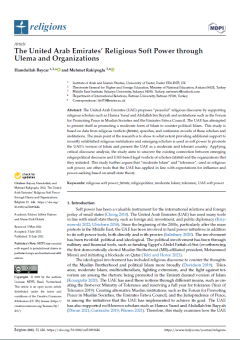The United Arab Emirates (UAE) proposes “peaceful” religious discourse by supporting religious scholars such as Hamza Yusuf and Abdallah bin Bayyah and institutions such as the Forum for Promoting Peace in Muslim Societies and the Emirates Fatwa Council. The UAE has attempted to present itself as promoting a moderate form of Islam to counter political Islam. This study is based on data from religious verdicts (fatwās), speeches, and conference records of these scholars and institutions. The main point of the research is to show to what extent providing additional support to recently established religious institutions and emerging scholars is used as soft power to promote the UAE’s version of Islam and present the UAE as a moderate and tolerant country. Applying critical discourse analysis, the study aims to uncover the existing connection between emerging religiopolitical discourse and UAE-based legal verdicts of scholars (ulamā) and the organizations that they initiated. This study further argues that “moderate Islam” and “tolerance”, used as religious soft power, are other tools that the UAE has applied in line with expectations for influence and power-seeking based on small state theory.





